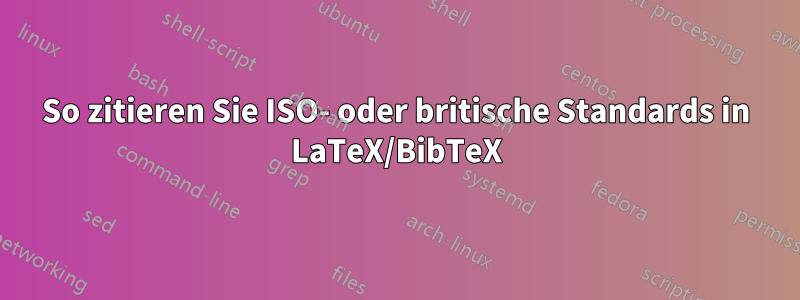
Ich versuche dies zu zitierenBritischer Standardin meiner Abschlussarbeit, aber die Verwendung des Üblichen @keysscheint nicht wirklich zur Verdeutlichung beizutragen. Gibt es eine praktischere Möglichkeit, dies zu tun, da es nicht wirklich in eine typische Kategorie fällt?
@article{BSEN6232
, author = {British-Standard-Institution}
, title = {Part 2: Determination of density and porosity}
, journal = {Advanced technical ceramics. Monolithic ceramics. Gerneral and textural properties.}
, year = {1993}
, pages = {1--16}
, isbn = {0580217728}
, publisher = {BSI}
, institution = {British-Standard-Institution}
}
Antwort1
Ich habe ein wirklich nützliches Beispiel gefundenHier.
Hier ist der Code:
@techreport{ISO13586,
type = {Standard},
key = {ISO 13586:2000(E)},
month = mar,
year = {2000},
title = {{Plastics -- Determination of fracture toughness -- Linear elastic fracture mechanics ({LEFM}) approach}},
volume = {2000},
address = {Geneva, CH},
institution = {International Organization for Standardization}
}
Und es gibt ungefähr Folgendes aus:
ISO 13586:2000(E) (2000). Kunststoffe – Bestimmung der Bruchzähigkeit – Lineare elastische Bruchmechanik (LEFM). Standard, Internationale Organisation für Normung, Genf, CH.
Ich hoffe es hilft.
Antwort2
Nach umfangreichen Untersuchungen verwende ich dieses Schema:
@techreport{iso_central_secretary_systems_2016,
address = {Geneva, CH},
type = {Standard},
title = {Systems and software engineering -- {Lifecycle} profiles for {Very} {Small} {Entities} ({VSEs}) -- {Part} 1: {Overview}},
shorttitle = {{ISO}/{IEC} {TR} 29110-1:2016},
url = {https://www.iso.org/standard/62711.html},
language = {en},
number = {ISO/IEC TR 29110-1:2016},
institution = {International Organization for Standardization},
author = {{ISO Central Secretary}},
year = {2016}
}
Details könnt ihr mit den offiziellen Infos vergleichen:https://www.iso.org/standard/62711.html
Ich habe ein anderesBeispiel im RIS-Formatzu.
Ich hoffe es hilft
Antwort3
Diese Frage ist alt, aber ich stehe derzeit vor genau demselben Problem. Ich habe die beschriebenen Lösungen ausprobiert, aber sie haben bei mir nicht funktioniert. Ich bin kein Experte, aber ich würde Folgendes vorschlagen:
@book{ISO.7637-1,
author = {International Organization for Standardization},
year = {2015},
title = {Road vehicles - Electrical disturbances from conduction and coupling: Part 1: Definitions and general considerations},
address = {Vernier, Geneva, Switzerland},
edition = {{ISO 7637-1:2015(E)}},
publisher = {International Organization for Standardization},
url = {https://www.iso.org/standard/63098.html},
}
Meine Ausgabe:
Antwort4
Für britische Normen fand ich Leitfäden zum Zitieren mitHarvardoderAPAStile, diese gelten jedoch möglicherweise nur für britische Abschlussarbeiten.
Dennoch ist laut Ratgebern die @bookKategorie am geeignetsten:
@Book{BSEN2011,
author = {British Standard Institution},
title = {BS EN 197--1:2011: Cement. Composition, specifications and conformity criteria for common cements},
year = {2011},
publisher = {BSI Standards Limited},
address = {London},
url = {https://bsol-bsigroup-com.proxy.lib.strath.ac.uk/PdfViewer/Viewer?pid=000000000030391002},
note = "Accessed: 30/03/2021"
}



